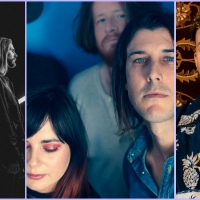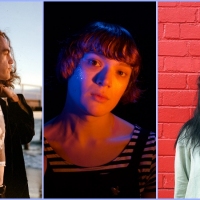 July in WA Music: SLUMBERJACK, Jaycee, Big Orange + moreAs we recap a big month full of homegrown releases, new tracks by HAIRCARE and No Nomad also get a shout.
July in WA Music: SLUMBERJACK, Jaycee, Big Orange + moreAs we recap a big month full of homegrown releases, new tracks by HAIRCARE and No Nomad also get a shout.

It’s 2020, and you shouldn’t feel guilty about your ‘guilty pleasure’ music
Fun fact, you’re allowed to like both DIY Melbourne punk-rock and Dua Lipa, and no-one’s going to look down at you for doing so.
When it comes to music, the term ‘guilty pleasure’ is strange.
Traditionally, it’s something used to group songs that your liking of would be better kept a secret; a song you take pleasure from, but feel guilty in doing so because it’s out of your norm, or ‘frowned upon’ to like (because of taste, that is - there’s a difference in an artist being frowned upon due to assault allegations or things of a similar ilk).
Over time, a few different sub-categories of a ‘guilty pleasure’ have popped up, and chances are there’s a few that you like - even if you might be a little ashamed to admit you like. There are the songs ‘so bad they’re good’ - sometimes one-hit-wonders, sometimes ‘meme songs’ à la The Gummy Bear Song, sometimes just songs generally considered terrible. There are songs not exactly built to be liked, or conversely, fabricated out a sense of irony to be exactly the type of song built to be liked, purposefully built from clichés (Miley Cyrus’ Ashley O character in Black Mirror is a great example of this, and Ashley O’s On A Roll leads Spotify’s ‘Guilty Pleasures’ playlist).
However, the most common collection of acts under the ‘guilty pleasures’ brand is pop music, largely by women - Shania Twain, Britney Spears and TLC all feature heavily on Spotify’s aforementioned playlist - and late-90s, male-centric groups like NSYNC. To many, an artist like Britney Spears or NSYNC is the epitome of what a guilty pleasure is, built from the shame of having a song like Toxic amongst playlists full of Radiohead and Bon Iver. They’re songs that stick out from the pack, songs that you’re worried ‘the boys’ will find out you like, because you don’t want to be at the butt of a joke that you feel tampers with your masculinity or sense of ‘coolness’.
In recent years, the line between pop music and non-pop music has blurred. There are certain pop acts - including many associated with guilty pleasures - that are ‘cool’ to like, because they’re seen as somewhat independent - or ‘slept on’ - compared to the greater pop canon. Take an artist like Carly Rae Jepsen, for example. Her song Call Me Maybe is peak guilty pleasure, sitting in the Venn diagram of two of the terms’ main categories - pop woman and meme-like one-hit-wonder. However, despite being pop music through and through, she’s regarded in a niche field of alt-ness; not in the way that her music has any crossover with indie or alt-pop, but in the way that she’s viewed as separate from an artist with the commercial success of Katy Perry, for example.
In a different way, there are also pop musicians targeting niche realms of pop music that make it feel a little less sinful to digest, perhaps because you’re able to spin a conversation about their pop-isms into a conversation about the other genre niches they grapple with. Take a musician like Poppy, once considered a guilty pleasure due to her meme-like rise, but now associated with the metal and heavier rock communities, due to a sudden pivot in her sound. Another example comes from the conversations amongst the dance communities surrounding the release of Dua Lipa’s Future Nostalgia record; people in dance circles admitting their liking of Dua Lipa - a bonafide pop star - being able to avoid judgement from ‘dance bros’ by coming from a production-focused perspective: “I didn’t really like Dua but the beat on Hallucinate is sick.”
It’s clear that the guilty pleasure category is vague and more often a subjective term considering people’s specific music tastes, rather than an over-arching genre or sub-category of music (although you’ll find that some specific songs sit in many guilty pleasure-themed playlists). However, in a time where the boundaries of pop music are blurring and distinctively pop acts can be considered ‘cool’ in alt worlds, is it worth throwing out the term guilty pleasure all together?
In our opinion, yes.
In 2020, saying a song is a ‘guilty pleasure’ feels like a bit of a cop-out. There’s a reason why a song is popular or an act is achieving success, and that’s because at the end of the day, it’s music that makes you feel a certain way - whether it be an album like Taylor Swift’s folklore being drenched in heavy emotions and woe, or a light-hearted pop song like Lady Gaga’s Rain On Me which makes you loosen up, and want to down a bottle of Passion Pop as if you’re 17 again. The aim to evoke emotions in something is core to what music is, regardless of whether it’s being made through a DIY punk band from Melbourne or a chart-topping superstar who wrote the song with Max Martin and 49 other songwriters. It’s all the same at the end of the day, and just because one is deemed popular by the general population doesn’t mean it’s uncool to like.
If you’re a hip-hop fan who usually aligns yourself with ‘underground’ rappers or ‘cool’ rappers, you’re not going to lose any ‘cred’ for saying that you liked Cardi B rap “I want you to touch that lil' dangly thing that swing in the back of my throat.” There’s a reason you like it, and you shouldn’t feel guilty because enough other people like it for the exact same reason that it’s going to be number one in the US next week! Afraid of admitting that you’ve been spinning the new Lady Gaga record when your record collection is largely Bob Dylan vinyls? Who cares! They’re popular acts for the same reason when it comes down to it!
You shouldn’t feel ashamed by music that doesn’t usually sit within your music taste. It’s your music taste, founded on your opinions, and you have complete control over that. If the FKA Twigs fan community you hex people with and stir cauldrons alongside (what else would they do?) want to kick you out because you think Jennifer Lopez’s Jenny from the Block is a great song, then they’re the toxic ones - not you! You’re better off without them! If your mates that are ride-or-die Radiohead fans don’t want to talk about music with you because you mentioned you like Taylor Swift’s new album, then guess who has the personality in your friend group - not them!
It’s strange that it’s often happy, upbeat and occasionally meaningless pop music regarded as guilty pleasures, and the opposite - sad, down-tempo, emotive - automatically classed as being ‘real’ and ‘authentic’. It’s 2020, the world is turning to shit - if it’s not there already - and everyone is looking for a way to escape. Dumb, fun music is that escape for a lot of people, and you shouldn’t feel guilty for enjoying it especially in a time where it’s needed more than ever.
The only guilty pleasure I’d accept is Ashley Tisdale’s second studio album Guilty Pleasure, or the one guy who mentions that his guilty pleasure is slowed down Alvin and the Chipmunks albums.
 July in WA Music: SLUMBERJACK, Jaycee, Big Orange + moreAs we recap a big month full of homegrown releases, new tracks by HAIRCARE and No Nomad also get a shout.
July in WA Music: SLUMBERJACK, Jaycee, Big Orange + moreAs we recap a big month full of homegrown releases, new tracks by HAIRCARE and No Nomad also get a shout.
 Meet nine non-binary and women musicians who produce and mix their own workThere aren't a lot of musicians who produce their own work, let alone mix it too. Here are nine musicians - all female-identifying or non-binary - who buck this trend.
Meet nine non-binary and women musicians who produce and mix their own workThere aren't a lot of musicians who produce their own work, let alone mix it too. Here are nine musicians - all female-identifying or non-binary - who buck this trend.